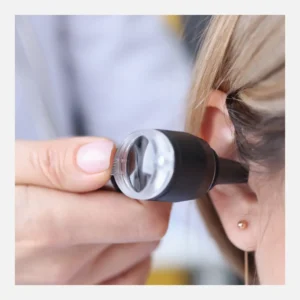Muffled Hearing: Common Causes and When to Worry
Updated February, 2026
That underwater, cotton-in-the-ears feeling has a name: muffled hearing. Sounds reach you, but they arrive dull, distant, or slightly blurred — like someone turned down the clarity dial on the world around you. It can come on suddenly after a loud concert or creep in slowly over months. It can affect one ear or both. And while it often resolves on its own, muffled hearing is sometimes your body’s way of waving a flag worth paying attention to.
Understanding what’s behind your muffled hearing is the first step toward clearer sound. Many causes are simple and temporary. Others are worth a professional look. Here’s what you need to know.
What Muffled Hearing Actually Feels Like
Muffled hearing isn’t the same as total hearing loss. You’re still picking up sound — it just lacks sharpness. People often describe it as:
- Listening through a closed door or thick blanket
- A plugged or full sensation in one or both ears
- Voices that sound farther away than they should
- Difficulty catching words in conversation, even when the volume seems fine
- A sensation of pressure deep in the ear canal
These symptoms can appear together or on their own. They’re worth noting — especially if they hang around for more than a few days. According to a detailed overview from Healthline, muffled hearing can arise from disruptions at any point in the auditory pathway — the outer ear, middle ear, or inner ear.

Common Causes of Muffled Hearing
Most cases of muffled hearing fall into a handful of familiar categories. Here’s a look at what’s most likely going on.
Earwax Buildup
Earwax exists for good reason — it traps debris and protects the ear canal. But when it accumulates faster than it clears, it can block the canal and muffle sound noticeably. This is one of the most common and most easily resolved causes of muffled hearing. Safe professional removal typically brings relief quickly. If you’re not sure whether wax is the culprit, it’s worth finding out before reaching for a cotton swab. We have a full guide on ear wax removal options near you if you’d like to learn more.
Allergies and Sinus Congestion
Seasonal allergies and sinus infections can block the Eustachian tubes — the small passageways that equalize pressure between the middle ear and the back of the throat. When those tubes swell shut, sound transmission suffers. This type of muffled hearing tends to come and go with congestion levels and usually clears once the underlying inflammation settles down.
Colds and Upper Respiratory Infections
A head cold is a classic trigger for that stuffed-up, muffled feeling. Congestion from a cold can press on the Eustachian tubes and temporarily alter how sound reaches your eardrum. For most people, hearing returns to normal within a week or two as symptoms resolve.
Ear Infections
Middle ear infections cause fluid to build up behind the eardrum, which can significantly dampen sound. Infections often come with ear pain, pressure, or a feeling of fullness. Some resolve without treatment, but persistent or painful ear infections benefit from medical evaluation.
Noise Exposure
Loud noise — a concert, power tools, a single close blast — can temporarily or permanently damage the delicate hair cells in the inner ear responsible for converting sound into signal. Immediately after loud noise exposure, muffled hearing is common and usually fades within 24 to 48 hours. Repeated exposure, though, can cause lasting damage that doesn’t fully reverse. Wearing hearing protection before noise exposure is far easier than addressing the consequences afterward.
Age-Related Hearing Loss
Presbycusis, or age-related hearing loss, often first shows up as a gradual dulling of high-frequency sounds — voices that seem muffled, especially in noisy environments. It’s one of the most common conditions in adults over 60 and tends to develop slowly enough that many people adjust without realizing how much clarity they’ve lost.
Certain Medications
Some medications are ototoxic, meaning they can harm the structures of the inner ear. These include certain antibiotics, chemotherapy drugs, diuretics, and high doses of aspirin or ibuprofen. If muffled hearing began around the time you started a new medication, that’s worth mentioning to your prescribing physician. We cover this topic in more detail in our post on common medications that can affect your hearing.
Meniere’s Disease
Meniere’s disease is an inner ear disorder that causes episodes of muffled hearing, tinnitus, vertigo, and ear pressure. Episodes can last anywhere from minutes to hours and vary unpredictably. The American Hearing Research Foundation’s overview of Meniere’s disease notes that while there’s no cure, symptoms can often be managed effectively with the right care plan.
Less Common but Worth Knowing
A few less-frequent causes also produce muffled hearing and deserve attention:
- Otosclerosis — Abnormal bone growth in the middle ear that gradually reduces sound conduction. Often hereditary.
- Acoustic Neuroma — A benign tumor on the auditory nerve that can cause progressive, one-sided muffled hearing or tinnitus.
- Perforated Eardrum — A hole or tear in the eardrum that disrupts sound wave transmission. Many heal on their own; some need treatment.
- Autoimmune Inner Ear Disease (AIED) — A rare condition where the immune system attacks inner ear tissue, causing fluctuating hearing loss.
- TMJ Disorders — Problems with the temporomandibular joint can create a feeling of ear fullness or pressure sometimes mistaken for hearing loss.
It’s also worth noting that some systemic diseases — infections, autoimmune conditions, and cardiovascular issues — have been linked to hearing changes. Our post on diseases that can cause hearing loss explores that connection in detail.
How Long Does Muffled Hearing Last?
Duration varies widely depending on the cause. Here’s a quick reference:
| Cause | Typical Duration | Resolves On Its Own? |
|---|---|---|
| Earwax buildup | Hours to days after removal | Yes, with proper removal |
| Cold or congestion | 1–2 weeks | Usually yes |
| Allergy-related | Variable, tied to congestion | Often yes |
| Ear infection | 1–2 weeks with treatment | Sometimes; may need antibiotics |
| Noise exposure (temporary) | 24–48 hours | Yes, if exposure was brief |
| Age-related hearing loss | Ongoing and progressive | No; managed with hearing aids |
| Meniere’s disease | Minutes to hours per episode | Episodes resolve; condition persists |
| Medication-related | Varies; may be permanent | Sometimes if medication is stopped |
| Acoustic Neuroma | Progressive if untreated | No; requires medical management |
Temporary causes are common and often self-limiting. If your muffled hearing has lasted more than a week, that’s a reasonable moment to check in with a hearing care provider — not because something is definitely wrong, but because it’s good to know.

When Should You Get a Hearing Test?
There’s no need to panic at the first hint of muffled sound. But a few situations are worth acting on sooner rather than later.
Consider scheduling a hearing test if:
- Muffled hearing has lasted more than a week with no improvement
- You notice hearing loss in one ear only, with no obvious cause
- You have tinnitus (ringing, buzzing, or humming) alongside the muffled sound
- Dizziness or balance issues accompany your hearing changes
- You’ve noticed gradually worsening clarity in conversations over several months
- You’ve had significant noise exposure and clarity hasn’t fully returned
A hearing test is a quick, painless, and non-invasive way to get a clear picture of what’s happening. It takes about 30 to 45 minutes and can answer a lot of questions in one visit. Think of it less as a diagnostic emergency and more like a vision check for your ears — a reasonable step whenever things seem a little off.
Why Skipping the Doctor Isn’t Always the Safer Choice
It’s tempting to wait muffled hearing out. And sometimes that’s perfectly reasonable. But hearing loss that’s caught early is almost always easier to address than hearing loss that’s been quietly progressing for years.
If earwax is the problem, professional removal restores clarity quickly. If an infection is involved, prompt treatment prevents complications. If age-related changes are starting, a hearing care provider can help you understand your baseline and catch any changes early. And if something like Meniere’s or an acoustic neuroma is behind your symptoms, early evaluation matters.
The earlier we understand what’s happening, the more options are available.
Ear Candling Isn’t the Answer
One quick note worth mentioning: ear candling is sometimes suggested as a home remedy for earwax-related muffled hearing. It doesn’t work, and it can cause burns or push debris further into the canal. If wax is your concern, our post on why you should skip ear candling explains why safer alternatives are a much better choice.
Frequently Asked Questions About Muffled Hearing
Can muffled hearing go away on its own? Yes, often. Cases caused by congestion, a cold, or brief noise exposure usually clear within days to two weeks. Persistent muffled hearing lasting longer than a week is worth a professional check.
Is muffled hearing in one ear more serious than in both ears? Not necessarily, but sudden one-sided muffled hearing with no obvious cause (like congestion or earwax) is worth evaluating promptly. It can indicate something that benefits from early attention.
Can stress cause muffled hearing? Stress can worsen tinnitus and may affect hearing perception in some people, but it’s not a direct cause of muffled hearing. Persistent symptoms should still be evaluated to rule out other causes.
What does a hearing test involve? A hearing test at our office is comfortable and non-invasive. It typically includes a brief ear examination and a series of listening tones and speech tests in a quiet booth. Results are reviewed with you the same day.
Do hearing aids help with muffled hearing? When muffled hearing is due to permanent hearing loss, properly fitted hearing aids can restore a great deal of clarity. Modern devices are remarkably discreet and perform well in a wide range of environments.
Muffled hearing has a lot of possible causes, and most of them are very manageable. If yours has been sticking around — or if you’re simply curious what’s going on — a free hearing consultation is an easy next step. Our team is here to help you understand what you’re hearing and what, if anything, to do about it. Contact us whenever you’re ready.
